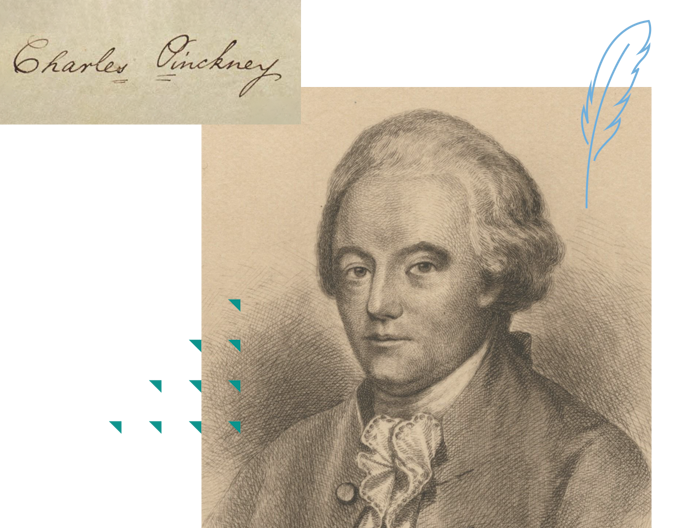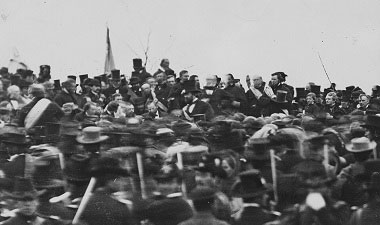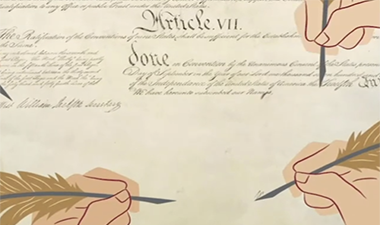Summary
Charles Pinckney effectively participated in the Constitutional Convention in 1878 and contributed to the final version of the Constitution. He later served as Minister to Spain.
Charles Pinckney | Signer of the Constitution
3:04
Biography
Charles Pinckney was born in Charleston, South Carolina, in 1757. He was the second cousin of fellow Framer of the Constitution, Charles Cotesworth Pinckney. Like his cousin, Charles grew up in a wealthy, slaveholding family and was assured of a generous inheritance from his lawyer/planter father. Charles was educated in Charleston and trained there as a lawyer. In 1779, he set up his own legal practice in his home city at the age of 22.
By this time, the War for Independence was already in its third year, and Charleston was in danger of capture by the British. Pinckney decided to enlist in the militia. His father did not support this decision for he was ambivalent about a permanent separation from Britain, but Charles, like his cousin (Charles Cotesworth), wanted to defend Charleston from enemy occupation. When the city fell to the British army in 1780, Charles, again like his cousin, was captured and made a prisoner of war. He was released in June of 1781.
Given his elite background, Pinckney had been welcomed into local government as soon as he passed the bar. He served in the state legislature for much of the next two decades. He also entered national politics by serving as a delegate to the Continental Congress in the years after the Declaration of Independence was issued, and, later, in the lead-up to the calling of the Philadelphia Convention. His years in the Continental Congress nurtured an intense nationalism, and he became an advocate of strengthening the Confederation’s power.
Pinckney was chosen as a delegate to the Constitutional Convention, joining his cousin (Charles Cotesworth), John Rutledge, and Pierce Butler as representatives of South Carolina. Confident and wealthy, Pinckney must have cut an impressive figure for a 30-year old in the company of men decades older and more experienced than himself. Indeed, William Pierce was enthused about him in his character sketches of the Framers. This “young gentleman” Pierce wrote, possessed a “great variety of knowledge” and boasted “a spirit of application and industry beyond most men.” He judged Pinckney a fine orator, noting that the young man “speaks with great neatness and perspicuity, and treats every subject as fully, without running into prolixity as it requires.” But for Pinckney, this was apparently not enough. Years later, he would insist he had been only 22 at the time that he served in the Convention, and thus, the youngest member of that distinguished company.
Pinckney’s ego also led him to exaggerate his influence at the Convention. He claimed to have submitted a draft that was the real basis for the final Constitution. Most historians dismiss this claim, although they concede that he spoke often and effectively in the Convention debates and contributed much to the final version of the Constitution.
Pinckney’s career did not suffer from his lies or exaggerations about his role in the creation of the Constitution. He went on to serve as governor of South Carolina from 1789 to 1792, and he chaired his state’s own constitutional convention. With his cousin, he led the Federalist Party in their state during these years. But by 1795, the younger Pinckney had dramatically changed his political allegiance. He opposed the Jay Treaty and began to champion the interests of the Democratic-Republican backcountry farmers against the state’s eastern elites of which he was a member.
Pinckney entered the U.S. Senate in 1798, not as a Federalist, but as a member of the Jeffersonian Party. In 1800, during the presidential contest that pitted Adams against Jefferson, he worked as Jefferson’s campaign manager in South Carolina. As his reward, President Jefferson appointed Pinckney as Minister to Spain. After this diplomatic mission, Pinckney returned to Charleston to lead the state’s Democratic-Republican Party. Once a self-satisfied member of the planter elite, he now advocated better representation for backcountry districts and universal white manhood suffrage.
In 1821, Pinckney’s health began to fail, and he died of edema, the fluid retention that the 18th century referred to as “dropsy.” He died three days after his 67th birthday.








